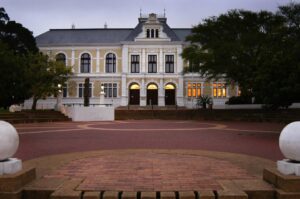
April M. Short
02-14-2024 ~ New findings and significant advances in research have scientists rethinking our origins, and museums around the world are working to catch the public up.
Breakthrough anthropological and scientific findings have allowed researchers to better trace the outlines, and begin to fill in the blanks, of the human evolutionary story in recent decades. We’re now able to trace the long threads of the social and cultural processes that produced today’s world. Humanity has the potential to be stronger and more resilient as we use our history as a guide to understand ourselves and visualize the future.
The story of our roots as a species, it turns out, is much longer and more complex than experts previously imagined. The common narrative of our early cave-dwelling ancestors as dunderheaded brutes is out of date and inaccurate.
Several new museum exhibits around the world are working to fill in some of the gaps around the past and update the public on the many advances in what we now understand about our origins. One hope at the foundation of many of these new exhibits is that by helping people to understand the long past, we may better understand our current moment as a species, and navigate ways forward together.

Museo de la evolución humana – Burgos Source: es.wikipedia.org
Rethinking Our Origins in Burgos, Spain
The Museo de la Evolución Humana (Museum of Human Evolution) in Burgos, Spain, brings more than 40 years of research from excavations in the nearby archeological site of Sierra de Atapuerca to the public. Antonio José Mencía, director of communications for the museum, notes that more than 100 doctoral theses and 1,000 scientific articles have come out of the site, making the Atapuerca project an unparalleled reference in the field of human evolution. The museum serves as a means to share the breadth of insights and knowledge from the research with people in a way that is both accessible and educational.
“Having access to this data and the latest research allows us to build updated discourses aimed at visitors,” Mencía says. He shares that the museum opened its doors in 2010 at the behest of the co-directors of the Atapuerca Research Team. The researchers had been systematically studying humanity’s evolutionary origins for more than 30 years—with their discoveries published in magazines such as Nature and Science—and they had long desired to share what they were finding more widely with the public.
With support from the city council and community of Castilla and León, the museum opened with an entire floor dedicated to the main discoveries, showing original fossils from the surrounding region.
Mencía says that among the scientific studies carried out as part of the Atapuerca project in recent years, those focused on the first arrival of human groups to the Eurasian continent are particularly important, as they place these first arrivals at more than a million years ago.
“…[R]emains of a new species called Homo antecessor were located in 1994, breaking one of the paradigms about the first occupations of Europe being more than half a million years old,” he says. “Within the same mountain range, at another site called Sima del Elefante, researchers are currently working on a level dated to around 1.4 million years ago where part of the face of a hominid they called Pink [after Pink Floyd] was recently found [in 2022] whose species is yet to be determined.”
Pink is, to date, Europe’s oldest human fossil. Mencía shares that the study of other sites, such as the Sima de los Huesos cave, has made it possible to confirm concepts about the hominids known as “pre-Neanderthals”—including the fact that these ancient ancestors already had symbolic capacities.
“Very unique aspects have been worked on, such as the sequencing of mitochondrial and nuclear DNA in these populations that are around 400,000 years old,” he shares. “In the Galería de las Estatuas, DNA sampling has been carried out on the sediment itself to genetically sequence the Neanderthal populations.”
In other remarkable sites from different periods, such as Portalón de Cueva Mayor, which is located in the Atapuerca mountain range, researchers have been able to cite the establishment of some of the oldest agricultural and livestock productions in Western Europe, Mencía says.
In the museum, all the new information and research is adapted to educational formats and activities and is designed to reach the largest possible audiences, Mencía adds.
“Visitors who come to the Museo de la Evolución Humana have the opportunity to learn about these updates firsthand through different educational resources, such as ‘micro-explanations,’ provided in different areas of the museum by the educational care staff,” he says.
The museum adapts and updates the discourses presented to visitors as new research on human evolution emerges—something that has been happening at a relatively rapid pace over the last few decades. Online, visitors can explore the latest information in a detailed online archive as well as mini educational guides, which are free to download and are available in both Spanish and English.
Mencía shares that new technologies and social media networks have allowed the Museo de la Evolución Humana to reach a wider audience in recent years. The museum has put out a wide variety of educational video resources that are available on various platforms, such as YouTube, TikTok, Facebook, and Instagram. All of these educational resources were created using universal accessibility criteria, he says, noting that easy-to-read guides and the informaMEH project both provide options for sign language as well as subtitles.
Archaeology, biology, and paleontology are advancing at great speed, he notes, and surprising discoveries may emerge, but he urges patience, as “it will take time for the scientific community to approve them.”
“In our museum, we try to collect these advances in the form of conferences, exhibitions, etc. but we must be very cautious in implementing them definitively, as we are seeing that everything changes—from the arrival of the first sapiens in Europe or America to the appearance of some species still undetermined, or the origin of another,” he says. “We deal in figures and dates that range between tens of thousands of years. We must have patience not only for our origin but also for its understanding.”
Mencía says looking at the past may allow us, “to learn from the good and move away from our mistakes, although in our species it is very easy to make the same mistake twice.”
“Pride is almost part of the human condition—they say it will die after us—and that is why wars have not ended, and we fail to take seriously the problems that we see as distant, or for future generations,” he says. He adds that while we humans have a lot of experience with repeated mistakes, we also have the free capacity to rectify and change our ways.

Iziko South African Museum – Cape Town – Source: iziko.org.sa
Rewriting the Human Story in Cape Town, South Africa
The Humanity exhibit in the Iziko South African Museum, in Cape Town, is rewriting the human evolutionary story by asking visitors to consider their own role in the human collective.
The Iziko South African Museum initially opened in 1825, and like many museums of its era, for many years it told the story of human evolution from the point of view of primarily—perhaps exclusively—white, male explorers.
“We realized that the story of our origins was mostly only told from the point of view of the white explorer, making the content exclusionary for much of the South African public,” says Wendy Black, Chief Curator of Art and Social History at Iziko Museums of South Africa.
In her first few years as curator, Black says she realized the need for “telling the story of human evolution alongside the archaeological story.”
She stepped into her role at the museum after completing a PhD in bioarchaeology at the University of Cape Town in 2014, and she expanded on her research interests to encompass Indigenous rights and helped develop an active and transformed Archaeology Unit at the museum. As her role at the museum grew, she became a member of the board at the Human Evolution Research Institute (HERI).
“It was important to have the museum participate [in HERI], to improve public awareness around human evolution, help with the school curriculum and train teachers on how to teach the topic, and help grow the discipline by mentoring future archaeologists and paleoanthropologists, particularly Black women,” she says.
She began to develop the Humanity exhibition, first through various iterations on paper, then through discussions with the HERI team, in what became a collaborative effort.
“Together we developed new ways of telling the origin story with a focus on you and how you fit into that story. It also focuses on why Africa is so important.”
The Humanity exhibition opened in September 2023, and largely focuses on human inclusivity.
Black shares that the exhibition asks an overarching question: how do you fit into the human evolution story, and can you see something of yourself in our deep past?
“This question doesn’t only relate to how you look—biology—but also includes culture and technology,” she says. “Human evolution has always been told from what has been found in the past to the present. We undo that and start telling the story of human evolution today.”
In order to do so, the exhibition’s creators focus on DNA, which Black notes “is also important as we start looking at our ancestry, particularly, with current research trends.”
Black shares that the key understandings the exhibition’s education programs focus on include:
“Human variation today: Humans in South Africa and Africa are diverse in terms of how we look (skin color, tall, short, hair color, eye shape, etc.), how we live (environment, culture, locations, racism, experiences, emotions, and language), and what we are made of (DNA; genetics; skin, bones, and muscles), which also reflect our ancestry. But we are 99.9 percent the same biologically. Skin color i.e., melanin production, is a trait that is an example of human variation. We focus on skin color in the exhibit as it is generally one of the first things we notice about people around us and it has played an important role in the history of South Africa (and Africa, more broadly). But race defined by skin color is a social construct, not a scientific one. We also reflect on the fact that although humans vary a lot in terms of traits, like skin color, there is only one human species as defined by our DNA.
Humanity has deep, shared roots in Africa: A section of the exhibit focuses on the last 400,000 years of modern human evolution. We show that humans were living in lots of different places across Africa and beyond and that, like today, we would have been diverse. Human ancestors mixed, just like we do today, forming a connected ancestry that unites us in deep time. We have been humans for a long time (and came from many different places), which is interesting because it shows success and resilience, but also that we’ve been interconnected for a long time. What you thought was true isn’t. We’re not actually divided and haven’t been for a long time. Not only are we connected biologically but there is also a strong cultural connection. Just like us, our ancestors were clever, creative, and technologically innovative, also demonstrating spirituality, art, or symbolism. Although these traits might take different forms, these are the threads that connect us all in the past, as they do today.
Human evolution is like a braided stream: The infamous “ascent of man” image of human evolution is wrong. Not only because we no longer refer to all humanity as “mankind” but rather as “humankind,” but also because the evolution of our species was not linear or anagenetic. Instead, different groups migrated and mingled, coming together and separating again, over hundreds of thousands of years, much like a braided stream. DNA evidence shows how genes flowed between different human groups through time, and this combined with natural selection, mutation, and random events shaped our species.”
“It is important to understand aspects of human evolution so that you feel a part of humanity,” Black says. “So many people feel isolated, excluded, or discarded because of the way they look or what culture they practice. By understanding human origins, people will see that we are all more united than divided in so many ways.”
Race and racism are discussed strongly in the exhibit. Black says this is because “the foundations of how we have studied and understood human evolution and paleoanthropology, in general, have been racist.”
“Much of the past research was based on race-based scientific study and the ideas of race were perpetuated by this research,” she says. “This filtered into South African legislation, for example, leading the country on a path of legitimized separation of perceived races (apartheid). We show that race is not real, but racism is, and this is an important lesson many humans need to learn.”
In addition to updating the narratives around evolution and humanity’s shared roots, the Humanity exhibit made strides in developing content and design style in collaboration with a large collective of people.
“We consulted with all local communities and diverse population groups to see what everyone would want to see in the human evolution exhibit, and how they would like to see it,” Black says, adding that this led to the development of specific design principles implemented in the exhibition, such as sustainability, the feeling of fluidity, interconnectedness and weaving through time, and the inclusion of the soil/earth.
She notes, for example, that to demonstrate “weaving through time” the curators “built a grass-weaved structure to help illustrate this, be truly African, and make people feel held in the space.” And objects on display in the exhibit “rest in soil from the regions where the objects were first unearthed.”
The exhibit also includes the ability for visitors to touch real objects.
“We have a wall of hand axes that people can touch to connect to something Homo erectus made, and to toolmaking,” Black says. “We also have fossil casts on display that people can touch.”
Black adds that the Humanity exhibit was a collaborative effort and the museum worked with local artists, “who brought their own sense of style and spirituality to their artwork.”
One example of this she shares is the work of street artist Mak1One, who uses a braided stream metaphor in his art, which is displayed at the end of the exhibit.
“The exhibit is both a scientific and cultural experience where the visitor can feel a part of humanity on a large scale, seeing how they came to be and why.”
Overall, she shares that the Iziko Museums of South Africa are trying to make all of their exhibitions more approachable and inclusive.
“We are steering away from Western-style exhibits and applying a more Afrocentric style, view and focus in the hopes of making our museums an exciting place to visit for locals and foreigners alike,” she says, adding that “HERI continues to build South African science by South African women through groundbreaking research and mentorship.”

Museum of US – San Diego
Source: en.wikipedia.org
Relinking the Past, Present, and Future in San Diego, California
For its first 100 years or so, San Diego, California’s Museum of Us was a traditional anthropology museum called the San Diego Museum of Man. Like many anthropology museums of its time, the original Museum of Man exhibited cultural materials from exoticized ancient civilizations like those from the Mayans, Incas, and Egyptians. While this model served the museum well for several decades, Haddan says, by the turn of the 21st century visitorship had dropped significantly.
“More modern demographics of museum visitors just weren’t finding that as engaging,” says James Haddan, the senior director of development and external communications for the Museum of Us. In an effort to connect with people and entice more visitors, the museum began to shift the focus of its exhibits away from individual cultural ethnographies and objects. Instead, it began to highlight cross-cultural themes and universal human traits, grounded in the present day.
Among the first of these new format exhibits, which remains in the museum today, is one called BEERology. It examines the history and present-day art of beer making and beer-related culture around the world. The museum has held public events, including beer tastings to promote the exhibit, and, Haddan says, it was a hit with San Diego locals, as the city has a thriving beer culture and is home to many a microbrewery.
“This was the first shift away from the idea that we were going to have exhibits on cultures X, Y, and Z and the rugs and ceramics that they made, or something like that,” Haddan says. Through beer of all things, people began to draw lines of connection not only to peoples of the past but also to existing people around the world with which they may not have otherwise found commonality.
In 2020, the museum adopted its current name, Museum of Us, with the aim to spark dialogue, self-reflection, and connections centered on the shared human experience.
Haddan shares that the museum’s focus is about “looking for the universal in the particular.”
“Sometimes when you look at something very specific in a community you can have a better understanding of much broader contextual issues that really impact us all,” he says.
Stories of immigration, he shares, are an example of this. The museum hosts the exhibit “Hostile Terrain 94,” which shares narratives from the perspectives of people immigrating to the U.S., with a focus on people crossing the Arizona-Mexico border.
“We tend to hear on the news and in other places, the perspectives of the border police or politicians, but we haven’t heard much of that narrative from the perspectives of the people who are crossing,” he says. “We don’t often hear the human story of what’s happening there.”
Haddan says the stories shared in the exhibit are likely to feel personal and relatable to the more than 21 percent of San Diego residents who are immigrants. And, he points out, immigration is a universal human concept dating back to our ancient prehistoric ancestors.
“There has always been immigration and migration, over thousands and thousands of years,” he says. “It is a universal theme that has created the way humans exist on this planet. It is something that’s really impactful to all of us.”
The exhibit also includes a large map with geolocated toe tags of the individuals who have died crossing the stretch of the border in the Sonoran Desert of Arizona, over a 10-year period. Some of the deceased have been identified, and others remain unknown. Haddan shares that the museum has had public programming for the exhibit in which people fill in the names and ages on the tags, which he shares is particularly impactful because, “you see children’s names, and you see people who died not only due to lack of water, heat, or cold but also due to violence. Suddenly that whole issue [of immigration] feels different.”
“We have a large undocumented population here in San Diego, as well as many people that are related to undocumented folks, and we have never seen those stories told in a museum before,” he says. “That’s one of the reasons why many people don’t often come to museums—because they don’t see themselves in the stories that are told there. We felt, as part of our name change and bigger picture change, that we want to be a place for those stories—stories from communities that haven’t been heard before or have been silenced by dominant cultural narratives.”
As part of the effort to tell the stories not often told in museums, they have adopted a Colonial Pathways policy in which they have committed to returning objects and the stories of ancestors to descendant communities, “if we don’t have permission from those communities to hold those objects.” As there are hundreds of thousands of objects in the museum—most of which came to the museum following archaeological digs—the process will take time, he says.
Also, as part of its efforts to rectify its colonial past, the museum has been working on mending its relationship with the local Kumeyaay community, as the museum is located on what has always been Kumeyaay land (the Kumeyaay people live in southern California and Mexico). He says the museum is working with the Kumeyaay community on a new version of “a very outdated Kumeyaay exhibit,” which would now be presented from the perspectives of the Kumeyaay community.
The museum has also worked with Mayan-descendant communities to completely overhaul a Maya exhibit that has been in the museum since it opened 100 years ago. For many years, the exhibit was written and shown from the perspective of white, male, and Western university-educated archaeologists and anthropologists. There was no input from the existing communities whose direct ancestors made the ceramics, rugs, etc. on display. For the new exhibit, all of the text was rewritten by the Mayan-descendant community and revamped according to their direct input and oversight.
Haddan points out that in many museum exhibits around the world that feature ancient cultures—be it Mayan, Incan, Aztec, or Egyptian—there is a failure to acknowledge that descendants of those cultures are living today.
“If you just took that exhibit by itself, you would think this was a group of people that no longer exists,” he says. While Mayan-descendant people make up a diaspora around the world, there are also large communities of Mayan-descendant people still living on their traditional lands.
“We took a lot of objects off display because those [Mayan-descendant] community members said they would prefer us not to have them on display. They weren’t asked about these objects leaving their communities.” The exhibit text now tells the story of the objects from the perspectives of these communities.
Some people become upset when Haddan shares the Colonial Pathways policy.
“They get stressed and say things like, ‘You didn’t steal that. Why are you giving it back?’” to which Haddan replies with a question: “How would you feel if someone dug up a cemetery where your grandparents or great-grandparents were buried and then took [their] remains to study scientifically—but they didn’t ask you—how would you feel if that happened to you?”
He says this helps humanize the people who have been harmed by museum displays.
“It’s a way of trying to help people have a more empathetic approach, or trying to center those other people’s feelings.”
An exhibit on structural racism titled, “Race,” is also in the process of being updated as conversations around race continue to evolve, Haddan shares.
He says the Museum of Us tackles issues like race and immigration because it is part of their moral obligation as a museum to do so.
“We take the position that museums by their very nature aren’t neutral,” he says. “I think there’s often been the idea in the past that museums were neutral, and they didn’t speak about or address those concepts,” he says. However, often by staying quiet, or by the very nature of the way a given museum was created, or how its collections are presented, and by whom, museums are taking a position.
“We make it a point to talk about these things,” Haddan says. “And we don’t want to be performative, so we don’t make statements on everything that’s happening in the world.” Instead, he says, the museum typically focuses on specific projects and concepts. The universal in particular.
And, the museum’s larger aim is for everyone to feel a sense of human commonality, so rather than shame people for what was done wrong in the past, they aim to call people into shared experiences and human stories.
“We try to take an approach that isn’t calling people out,” he says. “We really want the museum to be a place for all of us. We want to welcome everybody and hope that maybe you’ll leave feeling a little differently about some things than you did when you walked through the door.”
By April M. Short
Author Bio: April M. Short is an editor, journalist, and documentary editor and producer. She is a co-founder of the Observatory, where she is the Local Peace Economy editor, and she is a writing fellow at the Independent Media Institute. Previously, she was a managing editor at AlterNet as well as an award-winning senior staff writer for Good Times, a weekly newspaper in Santa Cruz, California. Her work has been published with the San Francisco Chronicle, In These Times, LA Yoga, Pressenza, the Conversation, Salon, and many other publications.
Source: Local Peace Economy
Credit Line: This article was produced by Local Peace Economy.


 02-19-2024 ~ The modes of communication that a society uses can tell us a lot about its political structure. A research study
02-19-2024 ~ The modes of communication that a society uses can tell us a lot about its political structure. A research study  02-18-2024 ~ Progressive economist Gerald Epstein explains how we can build a banking system that puts people over profit.
02-18-2024 ~ Progressive economist Gerald Epstein explains how we can build a banking system that puts people over profit.


